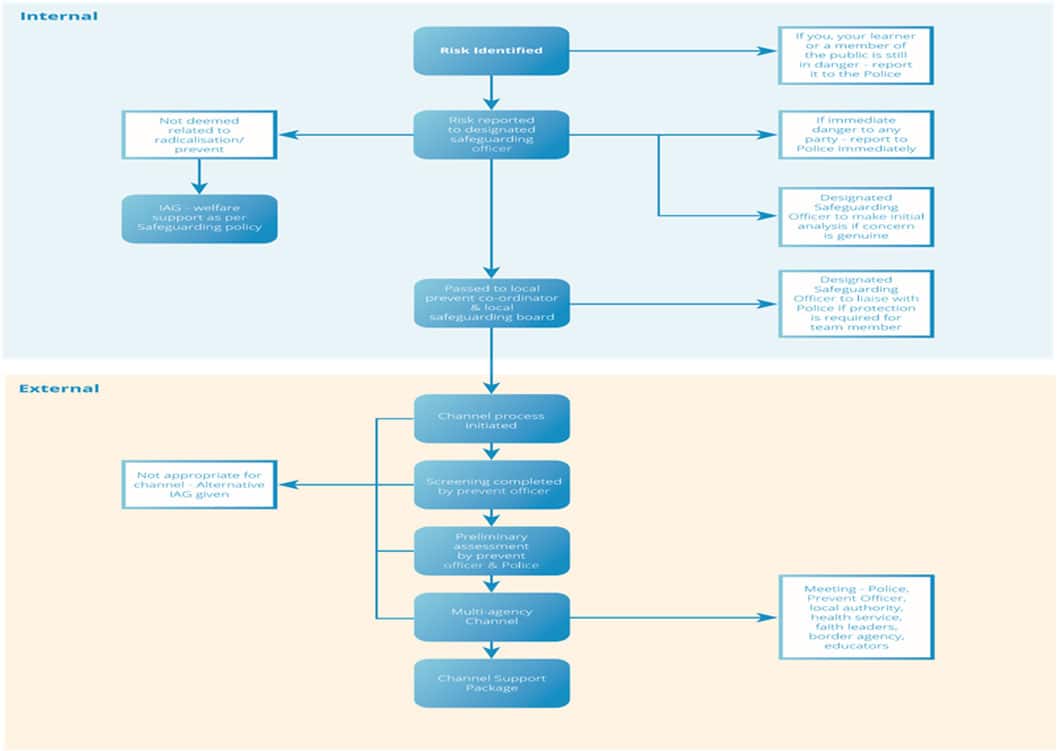WISDOM HOUSE PREVENT POLICY
Wisdom Community CenterWisdom House Prevent Policy
Scope
The policy is used to help reduce the threat to the UK from terrorism by stopping people becoming terrorists or supporting terrorism.
Introduction
Who does this policy/process apply to?
- The Wisdom House Head of CPD and Accreditation is responsible for the overall implementation and monitoring of this policy. The IQA policy will be communicated to all staff and associates involved in the operation of end- point assessment, all of whom have a responsibility to respect and follow the IQA procedure.
The Policy
- 1. Our commitment
- The government Counter-Terrorism and Security Act 2015, places a duty upon all education providers to have regard to the need to prevent people from being drawn into terrorism. This Prevent Duty forms part of the wider governments CONTEST counter terrorism strategy:
- Prevent terrorism – stop people becoming terrorists
- Pursue terrorism – disrupt and stop terror attacks
- Protect against terrorism – strengthen UK protection
- Prepare to deal with terrorism – mitigate impact of attacks that can’t be stopped.
- As a nation we continue to prioritise according to the threat posed to our national security; the allocation of resources will be proportionate to the threats we face. There has been an increase in lone acts of terror opposed to mass organised terror activities, the government strategy now includes ways in which to identify risk of these instances.
- The aim of the Prevent strategy is to reduce the threat to the UK from terrorism by stopping people becoming terrorists or supporting terrorism. The Prevent strategy has three specific strategic objectives:
- Respond to the ideological challenge of terrorism and the threat we face from those who promote it
- Prevent people from being drawn into terrorism and ensure that they are given appropriate advice and support.
- Work with sectors and institutions where there are risks of radicalisation that we need to address.
- 2. Objectives
- Wisdom House as an education provider have a responsibility to ensure:
- We have undertaken education in the Prevent Duty as identified by their leaders and managers
- We are all aware of when it is appropriate to refer concerns about apprentices/learners or colleagues to the provider’s safeguarding officer
- To exemplify British values of “democracy, the rule of law, individual liberty and mutual respect and tolerance for those with different faiths and beliefs” into our practice.
- 3. Scope
- This policy relates to all staff and apprentices/learners including those of our centres and contracted providers.
- 4. Key Contacts
- Head of Compliance –
- Lead Designated Safeguarding Officer –
- Prevent Coordinator –
- Counter Extremism – Department for Education – 0207 3407264/Counter.EXTREMISM@education.gsi.gov.uk
- 5. Definition’s
Radicalisation – is a process by which an individual or group comes to adopt increasingly extreme political, social, or religious ideals and aspirations that reject or undermine the status quo.- Terrorism – an act of terror/ violence based on a political objective, whether that means the politics of nationalism, ethnicity, religion, ideology or social class.
- Extremism – an ideology that is far outside the mainstream attitudes of society, including, vocal or active opposition to fundamental British values, including democracy, the rule of law, individual liberty and mutual respect and tolerance of different faiths and beliefs. This also includes calls for the death of members of the British armed forces.
- 6. Leadership & governance
- Prevent forms part of the safeguarding agenda which is featured as part of Quality and Compliance meetings. Wisdom House has a nominated person leading the Prevent initiative, and the Senior Management team are actively engaged within the Safeguarding and Prevent Agenda. It has been well documented within current literature, namely the Prevent Strategy 2011 and Keeping Children Safe in Education, that protecting people from being drawn into radicalisation should align with the current safeguards in place to protect apprentices/learners from the risks of safeguarding issues. Prevent duty is also embedded within IT, Social Media, Social Learning platform and Safeguarding policies.
- 7. Staff Education
- All staff are trained on the Channel process and how the duty engages with requirements of their role, via face to face, distance and 2 stages of certificated learning. Identification of vulnerabilities and indicators education is provided face to face (see Appendix 1 for additional guidance document for vulnerabilities and identifying indicator). Identifying risk at an early stage allows early intervention and is crucial to the Prevent duty and Channel process being successful.
- There is an annual CPD programme including formal learning plans, topical newsletters and quarterly updates provided by Line Managers.
- 8. Engagement with External Partners
- All centres/providers/employers will be made aware of Wisdom House’s duty by means of Product Managers, Client Executive and Customer Service Coordinators communication.
- Channels are in place to assist with meeting the Prevent Duty and avenues for raising concerns are established with Prevent coordinators nationwide.
- 9. Learner Safety, Engagement & Curriculum
- The duty encompasses building apprentice/learner resilience to the threat of radicalisation, challenging extremism and raising awareness of and demonstrating British values:
- • Democracy • Rule of Law • Tolerance and understanding of different faiths • Challenging discrimination
• Individual liberty - Opportunities to promote all of the above values are currently facilitated wherever possible.
- 10. Referral Pathways
- If an apprentice/learner has concerns about themselves, or you have concerns about another apprentice/learner being at risk of radicalisation, you should refer to the safeguarding lead.
- NB – should you feel an apprentice/learner, yourself or any members of the public are in immediate danger report to the police immediately.
- Once the Designated Safeguarding team has been informed, they will make a decision on whether the issue needs to be escalated to the local police Prevent Officer. The Designated Safeguarding team/staff member that is involved with the referral will then support the Channel process as seen fit by the local Channel panel. See Appendix 1 for the referral pathways. It should be noted that referral to the Channel process is not a criminal intervention.
- It should be noted that an apprentice/learner displaying one or a few of vulnerabilities and indicators does not mean the learner will necessarily be at risk of radicalisation, but it may do so. In all instances that concern you, you should report to the Designated Safeguarding Officer.
- 11. Safeguarding staff members as a result of referral
- While it is unlikely that the referrer would then be targeted. If someone received a threat or the police felt someone was under threat without them knowing, there are risk assessment, warning and safeguarding processes local police departments will apply as a matter of routine. The outcome might involve an investigation and arrests being made etc, such as markers on people’s mobile phone numbers or addresses, warnings to parties involved, or other measures.

Get In Touch
Wisdom Community Centre
Location: 168 High Rd, Chadwell Heath, Dagenham, Romford RM6 6LU, United Kingdom
Telephone: 02085973990
Mobile: 07883687099
Email: admin@wcc.co.com
